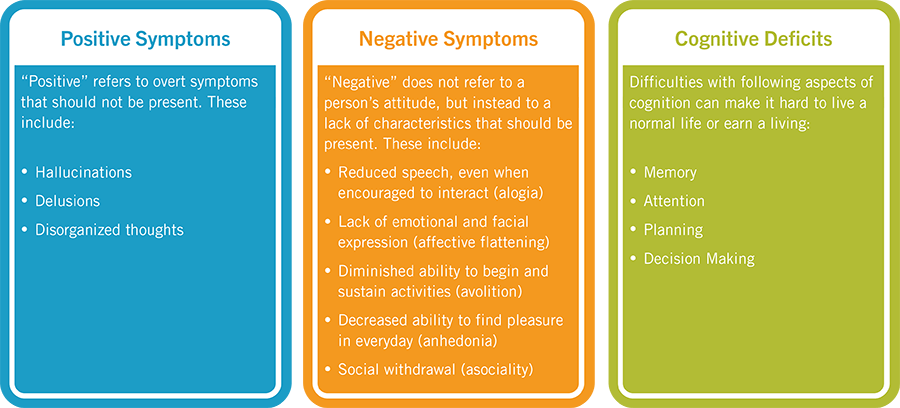

In the last 20 years, some authors have emphasized the difference between primary negative symptoms of the schizophrenic illness and secondary symptoms caused by depression, side effects of medication or deprivation. Kraepelin considered a characteristic disorder of volition to be specific to schizophrenia and did not observe this phenomenon in patients with manic-depressive disorder. Thus, negative symptoms are considered to have high priority in treatment development. At the same time, currently available treatments have at best modest impact on negative symptoms.

There is conclusive evidence that negative symptoms contribute significantly to long-term morbidity and poor functional outcome. Regarding negative symptoms of schizophrenia, this reduction manifests itself in phenomena that include avolition, anhedonia, affective flattening and poverty of speech. The term ‘negative symptoms’ was conceived because these symptoms are thought to reflect the absence or reduction of normal brain function. In the second half of the 20th century, research focused mainly on positive symptoms, but interest in negative symptoms has developed in a very dynamic fashion since the 1980s when a standardized assessment first became available. In the original descriptions of schizophrenia, negative symptoms were considered to be defining characteristics of the illness. Understanding negative symptoms as a variation of normal mental processes will strengthen the development of neurocognitive models and treatment approaches. Although the evidence does not allow for a definite decision concerning the dimensional distribution of negative symptoms, it certainly justifies exploring a dimensional approach with respect to its clinical and scientific utility. Second, we review evidence that negative symptoms show a continuous distribution from apparently healthy subjects to those with a fully developed clinical syndrome. First, enduring negative symptoms can even be observed in a variety of psychiatric disorders and they are not specific to schizophrenia. In this paper, we advocate a dimensional approach to negative symptoms, which is supported by two main arguments. In other words, these symptoms have been considered to be categorically different from other forms of human behavior and experience, whether they occur in healthy persons or patients with other psychiatric disorders. The description of new methods for measuring these devastating symptoms, coupled with the ongoing development of novel antipsychotics and agents that augment antipsychotics have fuelled renewed interest in the evaluation of negative symptoms and optimism that better treatments for negative symptoms can be found.Negative symptoms have been considered to be specific to schizophrenia or a subtype of schizophrenia: the deficit syndrome. However, each objective assessment trades off methodological rigor and detail against brevity of assessment and ease of use. Current rating scales 'capture' key domains of negative symptoms, in spite of considerable overlap between these domains. Negative symptoms can be difficult to evaluate objectively. Although efforts thus far to elucidate a distinct schizophrenia subtype based upon negative symptoms have yielded mixed results, there are nevertheless neurobiological correlates of the negative symptom typology.Ī review of nosology, typology, and assessment tools for determining core negative symptoms in schizophrenia. Negative symptoms of schizophrenia are a common, enduring, and debilitating component of the psychopathology of schizophrenia.


 0 kommentar(er)
0 kommentar(er)
